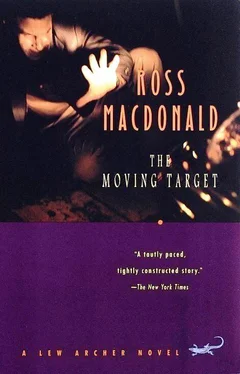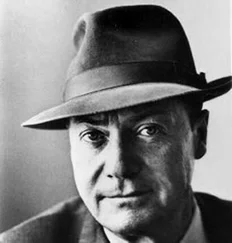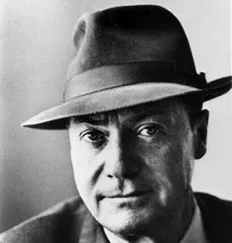“You should have told me before. That was her picture I showed you.”
“I didn’t know that.”
“It doesn’t matter now. I spent the evening with her. She was the woman I was with in the Valerio.”
“She was?” He seemed astonished. “Does she know where Sampson is?”
“It’s possible she does, but she wasn’t saying. I’m going to pay her another visit now. And I could use some help. Her household is a rather violent one.”
“Good!” said Taggert.
My reactions were still too slow, and I let him drive. He tended to bank on the turns, but all went well until we got to the Estabrook house. It was dark. The Buick was gone from the driveway, and the garage was empty. I knocked on the front door with the muzzle of my gun. No answer.
“She must have gotten suspicious,” Taggert said.
“We’ll break in.”
But the door was bolted and too strong for our shoulders. We went around to the back. In the yard I stumbled over a smooth, round object that turned out to be a beer bottle.
“Steady there, old man,” Taggert said in a Rover Boy way. He seemed to be enjoying himself.
He flung himself with youthful abandon against the kitchen door. When we pushed together it splintered at the lock and gave. We went through the kitchen into the dark hall.
“You’re not carrying a gun?” I said.
“No.”
“But you know how to use one.”
“Naturally. I prefer a machine gun,” he bragged.
I handed him my automatic. “Make do with this.” I went to the front door, pulled back the bolt, and opened it a crack. “If anybody comes let me know. Don’t show yourself.”
He took up his position with great solemnity, like a new sentry at Buckingham Palace. I went the rounds of the living-room, the dining-room, the kitchen, the bathroom, turning lights on and off. Those rooms were as I had seen them last. The bedroom was slightly different.
The difference was that the second drawer had nothing but stockings in it. And a used envelope, torn and empty, which was crumpled in a corner behind the stockings. The envelope was addressed to Mrs. Estabrook at the address I was visiting. Someone had scrawled some words and figures in pencil on the back:
Avge. gross $2000.
Avge. expense (Max) $500.
Avge. net $1500.
May – 1500 x 31 = 46,500 less 6,500 (emerg.) = 40,000
40,000/2 = 20,000.
It looked like a crude prospectus for a remarkably profitable business. One thing I knew for sure: the Wild Piano wasn’t making that kind of money.
I turned the envelope over again. It was dated April 30, a week before, and postmarked Santa Maria. While that was sinking in, I heard a heavy motor growling in the road. I snapped off the light and moved into the hall.
A wave of light washed over the front of the house, poured in at the crack of the door where Taggert was standing. “Archer!” he whispered hoarsely.
Then he did a bold and foolish thing. He stepped out onto the porch, in the full white glare, and fired the gun in his hand.
“Hold it,” I said, too late. The bullet rapped metal and whined away in ricochet. There was no answering shot.
I elbowed past him and plunged down the front steps. A truck with a closed van was backing out of the drive in a hurry. I sprinted across the lawn and caught the truck in the road before it could pick up speed. The window was open on the right side of the cab. I hooked my arm through it and braced one foot on the fender. A thin white cadaver’s face turned toward me over the wheel, its small frightened eyes gleaming. The truck stopped as if it had struck a stone wall. I lost my grip and fell in the road.
The truck backed away, changed gears with a grinding clash, and came toward me while I was still on my knees. The bright lights hypnotized me for a second. The roaring wheels bore down on me. I saw their intention and flung myself sideways, rolled to the curb. The truck passed ponderously over the place in the road where I had been, and went on up the street, the roar of its motor mounting in pitch and volume. Its license plate, if it had one, wasn’t lighted. The back doors were windowless.
When I reached my car Taggert had started the engine. I pushed him out of the driver’s seat and followed the truck. It was out of sight when we reached Sunset. There was no way of knowing whether it had turned toward the mountains or toward the sea.
I turned to Taggert, who was sitting rather forlornly with the gun in his lap. “Hold your fire when I tell you to.”
“It was too late when you told me. I aimed over the driver’s head, anyway, to force him out of the cab.”
“He tried to run me down. He wouldn’t have got away if you could be trusted with firearms.”
“I’m sorry,” he said contritely. “I guess I was trigger happy.” He handed me the gun, butt foremost.
“Forget it.” I turned left toward the city. “Did you get a good look at the truck?”
“I think it was Army surplus, the kind they used for carrying personnel. Painted black, wasn’t it?”
“Blue. What about the driver?”
“I couldn’t make him out very well. He was wearing a peaked cap, that’s all I could see.”
“You didn’t see his front plate?”
“I don’t think there was any.”
“That’s too bad,” I said. “It’s barely possible Sampson was in that truck. Or has been.”
“Really? Do you think we should go to the police?”
“I think we should. But first I’ll have to talk to Mrs. Sampson. Did you phone her?”
“I couldn’t get her. She was out with sleeping pills when I called her back. She can’t sleep without them.”
“I’ll see her in the morning, then.”
“Are you going to fly up with us?”
“I’ll drive up. There’s something I want to do first.”
“What’s that?”
“A little private business,” I said flatly.
He was silent after that. I didn’t want to talk. It was getting on toward dawn. The murky red cloud over the city was turning pale at the edges. The late-night traffic of cabs and private cars had dwindled to almost nothing, and the early-morning trucks were beginning to roll. I watched for a blue Army surplus truck with a closed van and didn’t see one.
I dropped Taggert at the Valerio and went home. A quart of milk was waiting on my doorstep. I took it in for company. The electric clock in the kitchen said twenty after four. I found a box of frozen oysters in the freezing compartment of the refrigerator and made an oyster stew. My wife had never liked oysters. Now I could sit at my kitchen table any hour of the day or night and eat oysters to my heart’s content, building up my virility.
I undressed and got into bed without looking at the empty twin bed on the other side of the room. In a way it was a relief not to have to explain to anyone what I had been doing all day.
It was ten in the morning before I got downtown. Peter Colton was at the flat-topped desk in his office. He had been my colonel in Intelligence. When I opened the ground-glass door he glanced up sharply from a pile of police reports, then lowered his eyes immediately to show that I wasn’t welcome. He was a senior investigator in the D. A.’s office, a heavy middle-aged man with cropped fair hair and a violent nose like the prow of a speedboat inverted. His office was a plaster cubicle with a single steel-framed window. I made myself uncomfortable on a hard-backed chair against the wall.
After a while he pointed his nose at me. “What happened to that which, for want of a better term, I choose to call your face?”
“I got into an argument.”
“And you want me to arrest the neighborhood bully.” His smile dragged down the corners of his mouth. “You’ll have to fight your own battles, my little man, unless of course there’s something in it for me.”
Читать дальше












